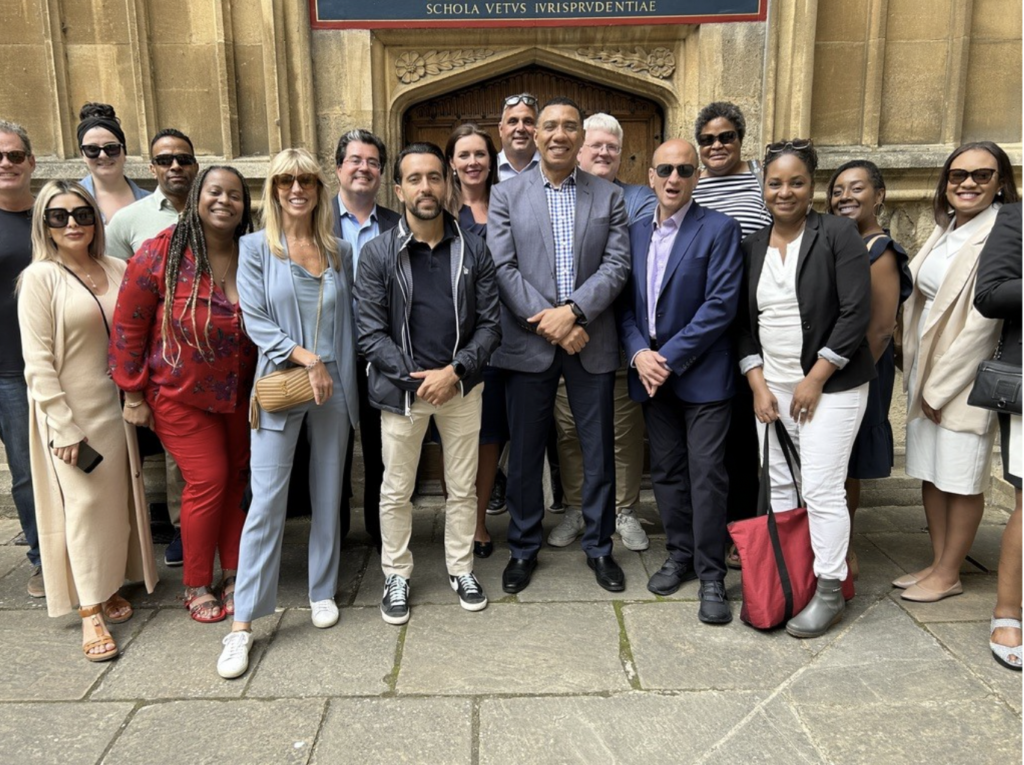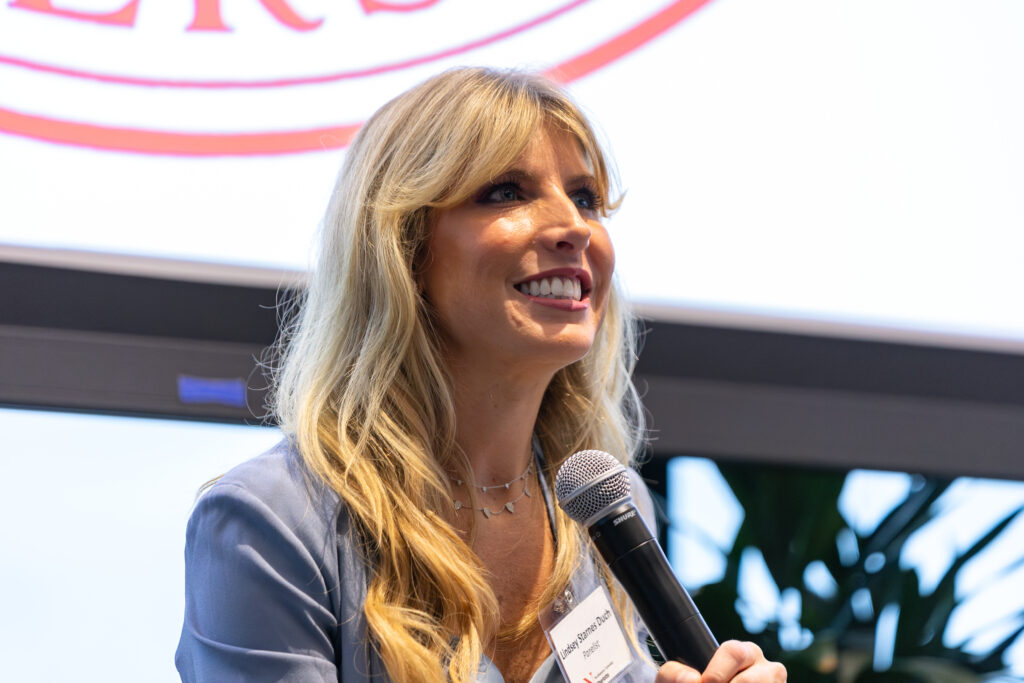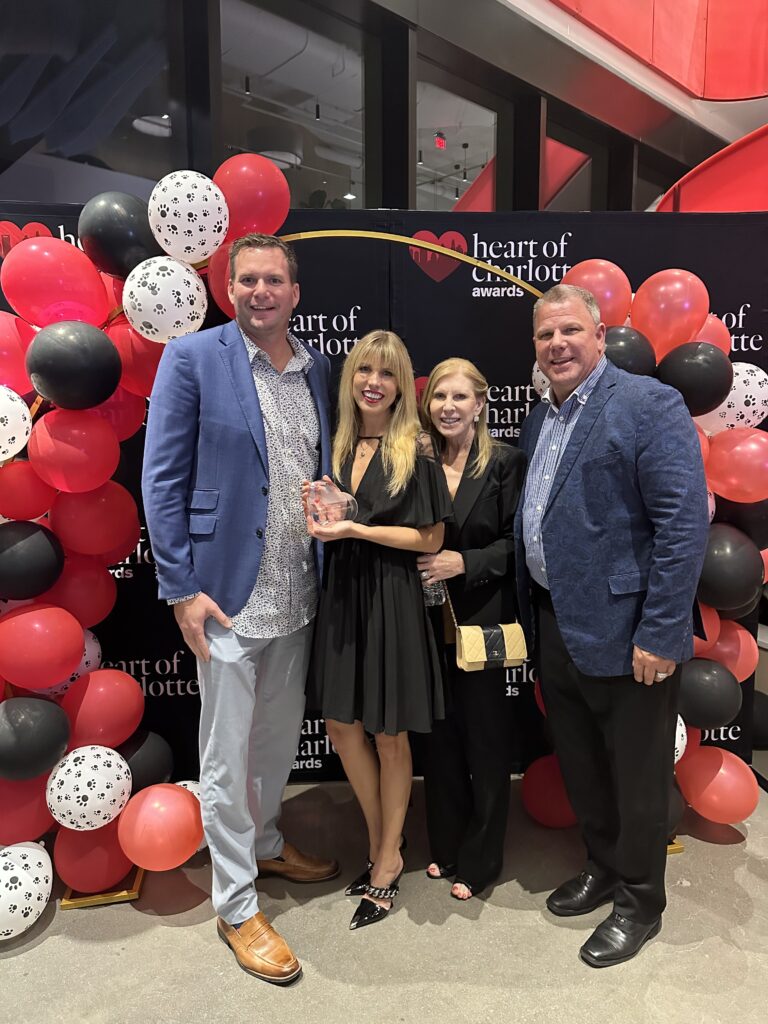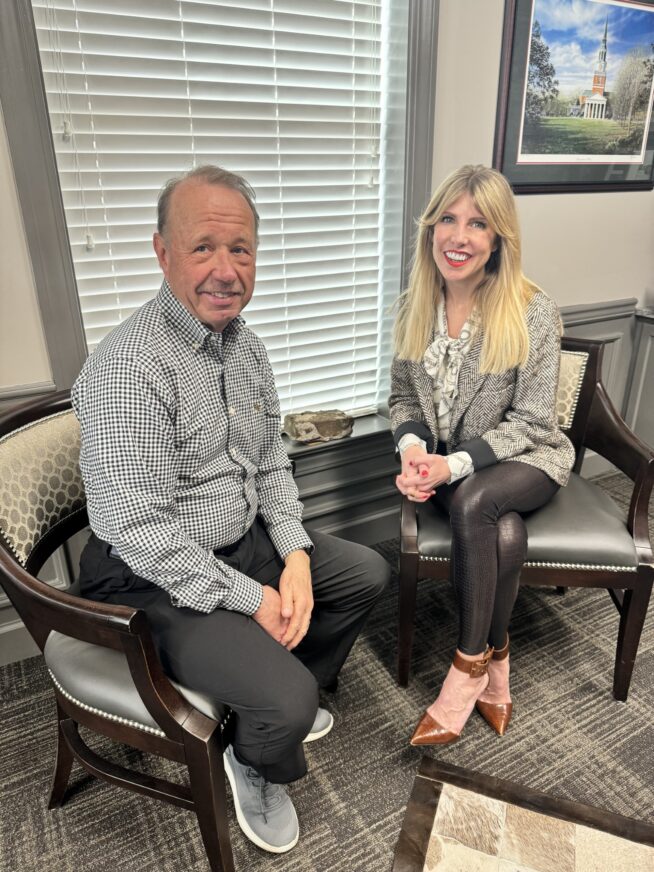Student Profile: Lindsey Starnes Duch, ‘24 Doctor of Law and Policy
Lindsey Starnes Duch, ‘24 Doctoral Law & Policy student, is the Vice President of Health Policy and Innovation at ALG Senior, the ninth largest senior living operator in the United States. She was recently recognized as ‘Health Policy Leader of the Year’ by the Heart of Charlotte annual awards, an event hosted by Northeastern University and Tryon Medical Partners that recognizes individuals who make a positive impact on the Charlotte community.
The award acknowledged Starnes Duch’s work caring for the region’s senior citizen community during the pandemic. She was solely responsible for the research, implementation and execution of almost 600 COVID-19 vaccine clinics from 2021 through 2023.



Her current role at ALG Senior includes working with lobbyists to help make shifts in state policy as it relates to senior citizens. Relevant issues that bring her to the state capitol include expanding Medicaid, resident reimbursement rates (the number of care hours awarded by that state to pay for residents’ care), and most recently, starting a Medicare Advantage plan for assisted living facilities, the first solely Individualized special needs medical plan for seniors with special needs.
“By definition, if you live in assisted living, you have special needs, but prior to this plan, you were just in a peer insurance-based Medicare plan. ALG Senior is not a provider partners insurance company for this plan. So, let’s say we have a woman who lives in a building and her doctor comes in and says she needs to go to the hospital; prior to 2024, she would have had to leave the facility to go to the hospital and we’d have lost control over her; we don’t know when they will release her or how long they will keep her. Then she gets sent to a skilled nursing facility just for IV management, and while she’s gone, she is exposed to illness/COVID-19 and we’ve caused her all this trauma from being removed from her familiar place until she may eventually not even come home. Now, because we’ve added two new layers of oversight, we can now look at that doctor and say, ‘we’ll do this all in the facility, we’ll give her treatment here, we’re not moving her.”
– Lindsey Starnes Duch
This work took seven years to get approval from U.S. Department of Insurance. Part of the team that spearheaded it underwrote proposals for the model and she is now the cog between a trifecta of physician groups, the insurance company, and the operations system, making it happen.
History & Mentorship
Starnes Duch was born and raised in Charlotte, NC. As a child, her father was an accountant with a demanding schedule. She remembers that, growing up, being together was important. She said, “My father traveled a lot, but when he was home, he was home.”
Starnes Duch grew up attending UNC-Charlotte basketball games with her family. In high school, she participated in dual enrollment, a program that provides opportunities to take college-level courses and earn credit toward future college degrees. She entered UNC Charlotte as a Sophomore. She said, “When I got to college, I realized that you can take as many hours as you want if someone approves it, so I took 21 hours each semester.”
Starnes Duch graduated with a double degree in History and English in just two years. With degrees coming from two separate programs, she found herself managing two different advisors, one in each department, adding an additional administrative element to her educational experience that she credits to her current competencies.
It was during college that Starnes Duch married young and had her first child at 20 years old. Nearing graduation, she knew she wanted to teach, so she became a high school teacher for six years.
Divorce from her first husband imposed the realization that a teaching salary was not going to be sufficient for a single mother providing for her children. She said, “I chose to get married early, and then I grew up. The divorce was scary, but it also allowed me to lean into who I am, who God made me to be instead of living with the choice I made at 18.”
Charlie Trefzger, ALG’s CEO, gave Starnes Duch an opportunity to work for him, albeit unknown to her father at the time, who was also the company’s CFO. She spent her first six weeks there learning her way around the company and attending every meeting she could find, whether it was HR, clinical meetings, or dietary planning meetings. Then she met with Trefzger and reported her findings, including areas for improvement. He told her to go and fix it. This experience awakened a deep interest in the field that led to Starnes Duch’s aspirations going from getting a paycheck to having a career. Caring for the elderly, she realized, was her calling.
Starnes Duch began the work by helping the marketing department get operational systems in place and she also streamlined vendor relationships until she found her home in the clinical department. Working with Dr. O’Neil, the CMO, Starnes Duch learned how complex the field of gerontology truly is. “I fell in love with taking ideas from our medical officer and making them realistic in this impossible environment that is assisted living.” she said. Shortly after, she went back to college, George Washington University (GW) this time, and obtained a master’s degree in gerontology.
“I didn’t really want to focus on gerontology; I wanted it to be a little more translative”
After completing her master’s degree, Trefzger encouraged her to prioritize her education even further. She started to shop programs and had a conversation with her advisor, Leonard H. Friedman from the Milken Institute School of Public Health, who told her that while she can pursue a second master’s degree, obtaining a PhD would deliver the professional gravitas she was after. This resonated with Starnes Duch, who began looking into doctoral programs that would fit her current life and existing obligations as a mother and full-time professional based in Charlotte.
She googled “doctorate programs for assisted living” and one of the first things that came up was the Northeastern University Doctor of Law and Policy program. She immediately thought, “this is the knowledge base Dr, Friedman was talking about, and I don’t have to move to Boston to accomplish this!”
In the thick of the pandemic, July 2022, Starnes Duch entered the Doctor of Law and Policy program. She also gave birth to her third child during her in the program. “You can be tired when you’re dead!”, she jokes.

“Having such a strong mentor was the kingpin. The trust that my mentor Charlie puts in me and the expectations he has of me are equal. Without him, I wouldn’t be here; there would be no ‘Doctor’ in my title.” she said.
Merits of Failure
Starnes Duch doesn’t take the act of failing personally or professionally with negativity. She firmly believes that making a mistake is not a personal setback; It is more a byproduct of experimentation. “Innovation cannot happen without failure. You cannot get better if you don’t plug in something incorrectly. If you take it personally, it will set you back,” she said.
“In our industry, when you’re doing work that effects other peoples’ lives, there are some days you just need to postpone things that aren’t life or death for your own balance. It helps that I have a great support system at work and home. But I found out I can’t do it alone and it’s fine. And failing is also fine! Let’s fail faster so we can identify exactly what was wrong and let’s fix it. As a leader, showing your team that you fail too is powerful because it shows that you are taking chances, and if you never fail you won’t take chances and your team will never take chances,” powerful because it shows that you are taking chances, and if you never fail you won’t take chances and your team will never take chances,”
– Lindsey Starnes Duch
The DLP Program
Starnes Duch, whose experience with the program has been mostly virtual with occasional trips to the Boston campus, describes her experience as being supportive, adaptive and ‘pliable in nature’.
“Program leadership does a great job hearing feedback and saying, ‘We can’t change this immediately, but we can tell you how to accommodate going forward’. They are also extremely adaptive, which was an important attribute in the pandemic.” For example, in 2022, the program suffered a supply chain problem, causing a month-long delay in delivery of core textbooks. The solution that the program team came up with was to manually scan copies of entire books, hundreds of pages, and upload them for students to access. The program carried on.
The program requires all new students to have their first encounter with Northeastern University in person. This sets a personable precedent for the individual student to forge relationships not just with professors but with peers. “This absolutely set the tone for me. The cohort culture has been different for me because I am a traditionally independent learner. But I now realize that having a group of peers that intimately know the stress level you are going through, and who are going through it with you, is the key to success. In my very diverse cohort of 15 students located across the country, we have lost only one person to medical leave – we haven’t lost anyone else because they couldn’t do it or they felt alone or unsupported.”

“You still need to advocate for yourself; if you’re having problems with a professor interaction, you’re an adult and you have to get it resolved. If I don’t particularly love a professor’s personality, or how they deliver expectations, I don’t take it personally, I adjust my approach and focus on delivering to that because the goal is higher than my satisfaction in the process. If I or another student raises a concern, the program leaders are great at addressing that. Collectively, we have all kept our eye on the prize.”
Advice
Asking what advice she would impart to doctoral students, Starnes Duch says that they need to find a person or professor in the program they connect with ‘communication style wise’. She said, “If you have a personal connection, then bombard them with questions. Send them snippets of your writing, tell them what you’re thinking with analytics, and as soon as you’re assigned your board, keep using them because it will alleviate the stress.”
“Now that I’m almost done, I’d say if you’re starting the program, pick the research area you want your focus to be, but don’t limit yourself to what you think your research should be. You’re going to struggle against what your head is telling you to do and what your heart wants to research and you’re going to need your heart to finish. Be open to changing your intended path.”
“Your choices do define you but they don’t limit you. I’m still a mom, I’m still a past teacher, I have all those experiences but they didn’t limit me.”